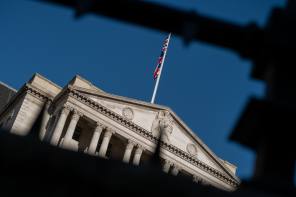

The consumer prices index including owner occupier’s housing costs (CPIH), measured in the year to July, was 2 per cent, lower than the 2.5 per cent seen in June as well as expectations, which were around a 2.3 per cent prices rise.
The rise was caused by increased spending on services since the re-opening of the economy on July 19, combined with a rise in savings during the pandemic which are now being spent.
Inflation has overshot or hit the Bank of England’s 2 per cent target each month since May.
Daniel Casali, chief investment strategist at Tilney Smith & Williamson, said markets are now likely to price in a greater chance of the BoE hiking interest rates over the next 12 to 18 months.
“Given an expected hawkish tone to be taken by the BOE against its major counterparts, like the Fed and ECB, there is room for sterling to appreciate against the dollar and euro,” he added.
Richard Carter, head of fixed interest research at Quilter Cheviot, said although in normal times an inflation rise of 2 per cent would set alarm bells ringing, markets and policy makers remain “relatively calm”.
“This is because policy makers – so far – have faith in the transitory narrative. They remain of the view that this bout of price increases will fade as the economy returns to normal.
“But this is really a bluff. The inflation moderation is largely as a result of technical factors, primarily the fact that the initial surge in price increases during the early phase of the lockdown last year has now dropped out of the numbers.
“While it looks likely that inflation pressures will moderate as we head into next year and the economic bounce-back has had the chance to run its course, there is no doubt that the Bank of England will be itching to scale back its pandemic stimulus programme in the coming months.”
The transitory debate
The BoE has consistently told markets that it expects this inflation rise to be “transitory”, and whilst it may rise as high as 4 per cent by the end of the year, it does not intend to tighten policy “until there is clear evidence that significant progress is being made in eliminating spare capacity and achieving the 2 per cent inflation target sustainably”.
Tom Wells, the manager of Sanlam’s Global Inflation-Linked Fund, told a Sanlam inflation webinar on July 15 that “all inflation starts by being transitory - it has to come from a low base.”
He added although inflation may turn out to be stickier than first thought, central bankers “will continue to call it transitory in order to erode this debt pile and to ensure that we don’t pull support from the economy too soon.”
However, in July the manager of the Ruffer Investment Trust, Duncan MacInnes and Hamish Baillie told shareholders that even if inflation is temporary, unless wages rise in tandem people will be financially worse off.
They said: "We think this 'transitory debate' misses the point entirely.
“Of course, house prices will not rise at 10-20 per cent annualised forever. Inflation is simply a measure of the rate of change. If that delicious beer garden pint was £4.50 in 2019 and now it costs £6, it has inflated by 33 per cent. Next year it might cost £6.25.
"The Bank of England might say 'See! Inflation was transitory, it's only 4 per cent, we told you!', but unless wages have risen by 39 per cent since 2019, you should be feeling worse off.”
Income in retirement
Helen Morrissey, senior pensions and retirement analyst at Hargreaves Lansdown, warned the rise in inflation was a stark reminder of the chunk this takes out of the spending power of retirement income over time.
“Typically, workers can combat this with wage increases, but retirees risk a long-term erosion of their financial resilience if their planning neglects the inevitable reality of price rises," she said.
Hargreaves' analysis showed a £250,000 pension pot today would only be worth the equivalent of £167,000 twenty years later if inflation was at 2 per cent.
“Retirement can last twenty years or more, care needs to be taken that what is affordable early in retirement does not become unaffordable later.
“The best package for a sustainable retirement hardwires in a growing income, whether through inflation linked pensions or annuities, state pensions or investment portfolios, or a combination, with a healthy chunk of cash for emergencies on the side.”
sally.hickey@ft.com



